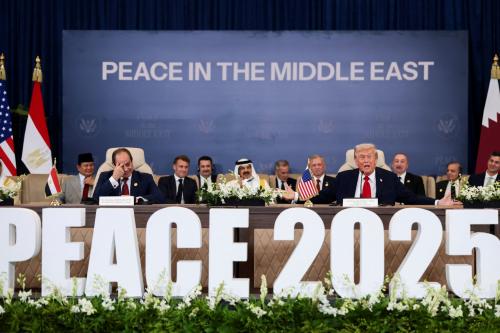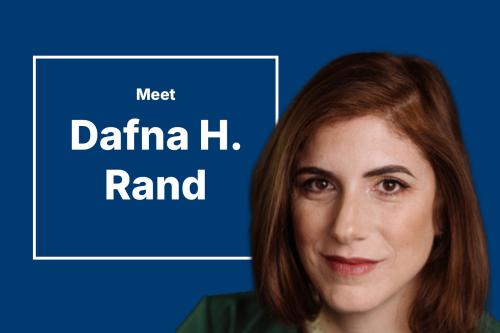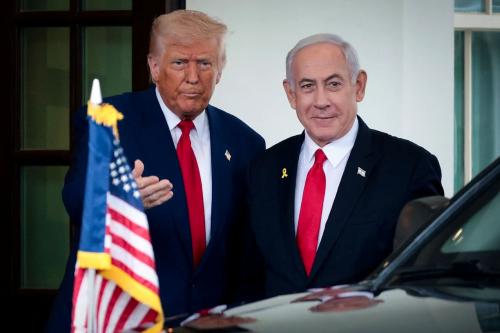

Upcoming Event
12:00 am EDT
1775 Massachusetts Ave., NW
Washington, DC
The Saban Center for Middle East Policy at the Brookings Institution held a policy briefing on July 31, 2006 to analyze the ongoing crisis between Israel and Hizballah, as well as the prospects for a ceasefire. Michael Herzog, Brigadier General and Visiting Military Fellow at the Washington Institute for Near East Policy, gave the Israeli perspective. Hisham Milhem, Washington Correspondent for An-Nahar (Lebanon), gave the Lebanese perspective. Shibley Telhami, Saban Center Nonresident Senior Fellow and Anwar Sadat Professor at the University of Maryland, commented on the view from the Arab states, and Martin Indyk, Director of the Saban Center, presented policy options for the United States.
Herzog began by saying that Israel is conducting three, parallel campaigns: One focused on military objectives, one focused on influencing perceptions, and one focused on long-term political objectives. Regarding the military campaign, Herzog argued that Israel has been degrading Hizballah’s capabilities and believes that it has destroyed over 70 percent of its missile arsenal. According to Herzog, when Hizballah for the first time used an Iranian Fajr-5 missile against the northern Israeli city of Afula, the Israeli Air Force was able to respond rapidly and destroy the launcher. One the perception front, however, Herzog argued that Hizballah has scored substantial victories. Even though Israel has had numerous successes on the battle field, this reality has not translated into public perception. Much of the gap between what is happening and its portrayal stems from what he termed the asymmetrical nature of the conflict, asymmetry that can be seen in three areas: the combatants, the media and the sides’ war aims. On the first asymmetry, the issue is that the Israeli armed forces are fighting against a militia and terrorist group that is based in civilian areas. As a result, no swift Israeli military victory is possible. The second asymmetry relates to the media. Israeli society and its media are transparent, and thus report on all Israeli casualties. In contrast, Hizballah, he argued, controls much of the Lebanese media and has only reported civilian casualties, rather than Hizballah losses. The third asymmetry relates to the very different objectives of Israel and Hizballah. Israel has set its aim very high. Its objective is a broad victory over Hizballah. The objective for Hizballah lies at the other end of the spectrum—Sheikh Hassan Nasrallah, the leader of Hizballah, simply wants his organization to survive. As such, Herzog said, any end to the conflict, short of Hizballah being eradicated, will be seen as a victory for Hizballah. Regarding the political campaign, Israel is trying to create the necessary conditions for arrangements after the ceasefire that will lead to long-term security. Herzog stressed for there to be long-term stability in the region, Iranian influence over Lebanon must end. One means of attaining this goal is the intervention and pressure of moderate Arab states.
Milhem said that at the outset of the conflict there were multiple scenarios for the conditions for a ceasefire, such as either an Israeli defeat of Hizballah or international intervention to halt the fighting. Some analysts argued, however, that the only factor that would stop the conflict would be heavy civilian casualties, such as those that occurred during Israel’s attack on the south Lebanese village of Qana in April 1996 during Operation Grapes of Wrath. Milhem pointed to the attack on Qana on July 30, 2006 which killed a large number of civilians (the final death toll has been put at 28). He said that this episode will put pressure on Israel to cease its military operations and accept a ceasefire without it having achieved its stated objective of defeating Hizballah.
Milhem warned that Lebanese public opinion increasingly supportive of Hizballah. While the Lebanese were at first angry at Hizballah, the party is now being seen as a protector of Lebanon, while Nasrallah is a galvanizing force for the Arab world in the manner that the late Egyptian President Gamal ‘Abdel Nasser was. Hizballah has a unique position as it can claim that it has scored victories against Israel and thus put a dent in Israel’s strategic deterrence. Indeed, Arab commentators, for the first time that he could remember, were ridiculing the Israeli military. Milhem argued, in agreement with Herzog, that Hizballah is therefore winning the war of perceptions, and thereby gaining in popularity. As a result, the Lebanese voices that are critical of Hizballah’s ideology will be muted by strong popular support for the group. Despite this, Milhem argued that Hizballah will accept a ceasefire because it cannot ignore rising casualties. Hizballah will probably accept a plan that includes partial disarmament, but that leaves its political and military structures intact.
Regarding Iranian influence in the crisis, Milhem argued that Iran did not invest in Hizballah only to see it waste its arsenal in this war. Rather, Iran invested in Hizballah so that it could deter Israel. Were Israel to attack Iran as a means of thwarting its nuclear program, Iran could use Hizballah to respond. Milhem warned that Iranian influence may actually increase because the Lebanese state has been so weakened by the current conflict.
Telhami began by analyzing the various perceptions of the conflict. He said that while Israel argues it has moral authority because it does not target civilians, the Arab public sees the bottom line and sees civilians being hit. Regarding conditions for a ceasefire, and the presence of an international force, Telhami argued that an international force will not manage to disarm Hizballah, and therefore can only serve in the region under the agreement of all parties. Telhami argued that it is unlikely that Hizballah will be disarmed for two reasons. First, the Lebanese state has been weakened. Second, for all of the damage that it has suffered, Hizballah has been relatively strengthened when compared to the damaged Lebanese by the support that the group has received in the Arab world. As a consequence, Telhami cautioned Lebanon to be patient, and to seek to co-opt Hizballah and to incorporate it into the Lebanese political system.
Telhami cautioned that there is a growing divide between governments and the public in the Arab world. Many citizens in the Arab world feel a sense of humiliation, and therefore find what he termed Hizballah’s resistance to Israel to be appealing. Telhami argued that while Israel has legitimate security needs and has to establish the credibility of its deterrence, the challenge it to find a means of achieving this without humiliating the Arab world.
Indyk said that there is a need to implement a plan that prevents any further civilian casualties. However, he pointed to the importance of also identifying the root causes of the crisis so that a long-term solution can be found. Indyk said that while there is broad agreement on what needs to be done, the tools to achieve the results may be lacking. The Bush Administration, he argued, does not have the diplomatic mechanisms in place to speak with either Syria or Iran. As a result, it has placed much of the burden of controlling Hizballah on the Lebanese government, a task that the government may not be capable of performing.
Indyk said the two most important matters in the short term are: a ceasefire; and the deployment of the Lebanese Army and an international force in southern Lebanon. After this has been accomplished, the international community should work to strengthen the government. Indyk suggested that any reconstruction projects or prisoner exchanges should be overseen by the Lebanese government. In this way, the Lebanese government will slowly gain strength and domestic support.

Scott R. Anderson, Aslı Aydıntaşbaş, Kemal Kirişci, Suzanne Maloney, Itamar Rabinovich, Dafna H. Rand, Shibley Telhami
October 13, 2025

Dafna H. Rand, Suzanne Maloney
October 8, 2025

Philip H. Gordon, Jon Finer
September 25, 2025